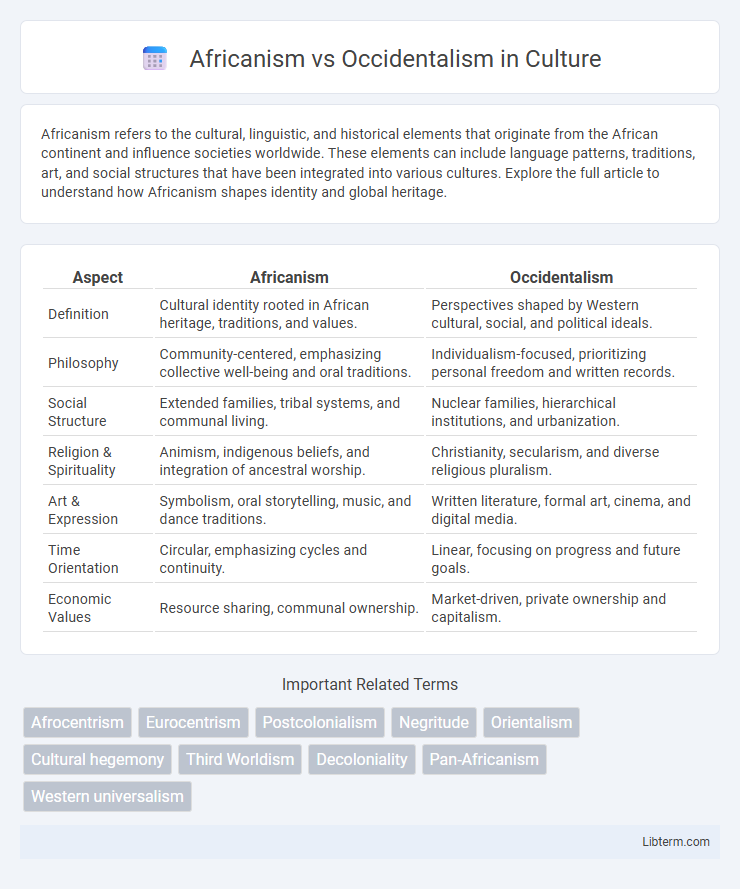Africanism refers to the cultural, linguistic, and historical elements that originate from the African continent and influence societies worldwide. These elements can include language patterns, traditions, art, and social structures that have been integrated into various cultures. Explore the full article to understand how Africanism shapes identity and global heritage.
Table of Comparison
| Aspect | Africanism | Occidentalism |
|---|---|---|
| Definition | Cultural identity rooted in African heritage, traditions, and values. | Perspectives shaped by Western cultural, social, and political ideals. |
| Philosophy | Community-centered, emphasizing collective well-being and oral traditions. | Individualism-focused, prioritizing personal freedom and written records. |
| Social Structure | Extended families, tribal systems, and communal living. | Nuclear families, hierarchical institutions, and urbanization. |
| Religion & Spirituality | Animism, indigenous beliefs, and integration of ancestral worship. | Christianity, secularism, and diverse religious pluralism. |
| Art & Expression | Symbolism, oral storytelling, music, and dance traditions. | Written literature, formal art, cinema, and digital media. |
| Time Orientation | Circular, emphasizing cycles and continuity. | Linear, focusing on progress and future goals. |
| Economic Values | Resource sharing, communal ownership. | Market-driven, private ownership and capitalism. |
Defining Africanism and Occidentalism
Africanism emphasizes the cultural, social, and political values rooted in African identity, highlighting indigenous traditions, communalism, and resistance to colonial legacies. Occidentalism critiques Western dominance by challenging Eurocentric worldviews, often portraying Western societies as culturally alien or morally flawed. Both concepts serve as frameworks for understanding the tensions between African self-assertion and Western influence in post-colonial discourse.
Historical Roots of Africanism
Africanism traces its historical roots to the Pan-African movement of the late 19th and early 20th centuries, emphasizing solidarity among African nations and diasporas against colonialism and racial oppression. Key figures such as Marcus Garvey and W.E.B. Du Bois advocated for African self-determination, cultural revival, and political unity as responses to Western imperialism. These foundations contrast with Occidentalism, which critiques Western cultural dominance and often arises as a reaction to perceived Western hegemony.
The Evolution of Occidentalism
The evolution of Occidentalism reflects shifting African perspectives on Western culture, power, and modernity, transitioning from colonial critique to nuanced interpretations of globalization and identity. Early African intellectuals framed Occidentalism in opposition to European imperialism, while contemporary discourse emphasizes cultural synthesis and resistance to homogenizing Western influence. This dynamic evolution highlights the complex interplay between African self-perception and the global impact of Western ideologies.
Key Philosophical Differences
Africanism emphasizes communal values, spiritual interconnectedness, and the collective identity rooted in indigenous traditions, while Occidentalism often stresses individualism, rationalism, and secularism derived from Enlightenment principles. African philosophical thought tends to prioritize holistic worldviews, integrating ethics, cosmology, and social harmony, contrasting with Occidentalism's analytic approach that separates disciplines and foregrounds empirical science. The epistemological divergence highlights Africanism's preference for oral traditions and experiential knowledge versus Occidentalism's reliance on written texts and formal logic.
Cultural Identities and Worldviews
Africanism emphasizes communal values, ancestral heritage, and spirituality as core aspects of cultural identity, contrasting sharply with Occidentalism's focus on individualism, rationalism, and material progress. These differing worldviews shape societal norms, belief systems, and historical interpretations, influencing how each perceives concepts of time, nature, and human purpose. The tension between Africanism and Occidentalism highlights ongoing dialogue about cultural sovereignty and the impact of colonial legacies on identity formation.
Impact on Literature and Arts
Africanism in literature and arts emphasizes indigenous themes, oral traditions, and cultural identity, fostering a resurgence of African heritage and decolonized narratives. Occidentalism critiques Western dominance and cultural imperialism, inspiring artists and writers to challenge Eurocentric perspectives and explore alternative worldviews. Both movements significantly reshape creative expressions by promoting cultural autonomy and redefining historical representation in global arts.
Political Implications and Power Dynamics
Africanism emphasizes indigenous governance models and the reclamation of political autonomy, challenging Western hegemonic structures rooted in Occidentalism. Occidentalism often perpetuates power imbalances by framing African political systems through a Western-centric lens, undermining local legitimacy and fostering dependency. These conflicting ideologies shape diplomatic relations, influence policy-making, and affect global power dynamics by either reinforcing or contesting neocolonial practices.
Religion and Spirituality: Contrasting Perspectives
Africanism in religion emphasizes ancestral worship, communal rituals, and a deep connection to nature, reflecting the spiritual cosmology rooted in indigenous African beliefs. Occidentalism, influenced by Western religious traditions like Christianity and secularism, often prioritizes individual salvation, doctrinal authority, and linear conceptions of time. These contrasting perspectives highlight the tension between holistic, communal spirituality in Africanism and the institutionalized, dualistic frameworks prevalent in Occidental religious thought.
Globalization: Bridging or Deepening the Divide?
Globalization acts as a double-edged sword in the context of Africanism and Occidentalism, amplifying both cultural exchange and ideological conflicts. Africanism emphasizes indigenous knowledge and identity, resisting homogenizing Western influences, while Occidentalism critiques Western dominance and cultural imperialism. The interaction within globalization often deepens divides by reinforcing stereotypes and unequal power dynamics but also offers platforms for intercultural dialogue and hybrid identities.
Toward Mutual Understanding and Integration
Africanism and Occidentalism explore complex cultural identities and historical perspectives that shape Africa-West relations. Toward mutual understanding and integration, emphasizing shared values, intercultural dialogue, and collaborative development initiatives promotes a balanced exchange and counters stereotypes. Strengthening institutional partnerships and educational programs facilitates deeper awareness, fostering respect and socio-economic cooperation between African and Western societies.
Africanism Infographic

 libterm.com
libterm.com